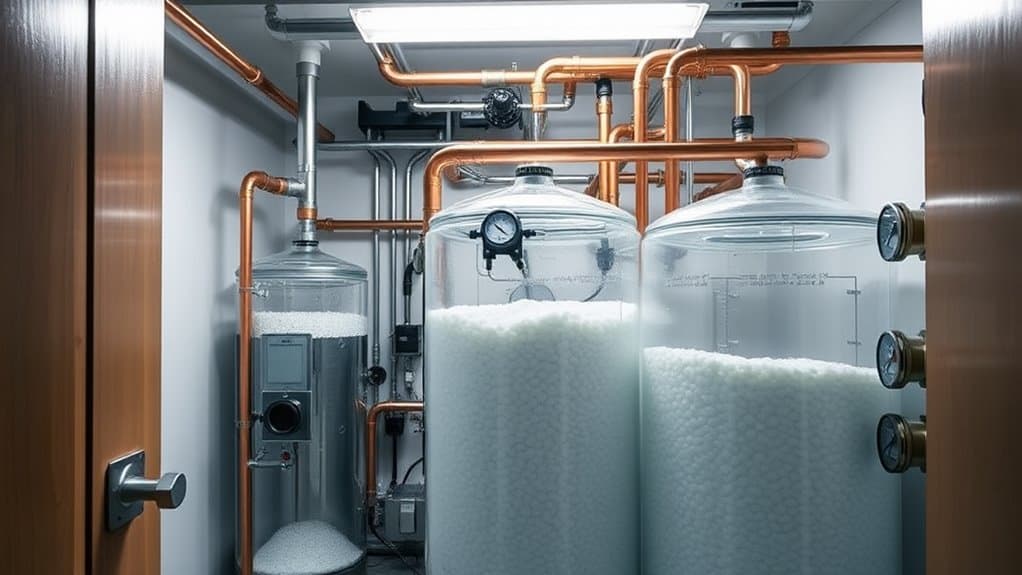Luxury hotels aren’t hiding anything exotic—they’re using commercial-grade water softening systems from brands like Culligan, Pentair, and Robert B. Hill. We’ve found these systems remove minerals that damage equipment and diminish guest experiences. They save hotels up to 40% on detergent costs while delivering softer towels, spot-free glassware, and longer-lasting appliances. The difference is especially noticeable in hard water regions like Round Rock. The financial benefits extend far beyond what most guests realize.
Key Takeaways
- Luxury hotels invest in industrial-grade dual-tank systems from Culligan, Pentair, and Robert B. Hill not available to consumers.
- Hotels use ion exchange technology that processes hundreds of thousands of gallons daily for superior water quality.
- Proprietary water softening systems save hotels up to 40% on detergent costs while extending equipment lifespan.
- Custom-engineered solutions with 24/7 monitoring capabilities ensure consistent water quality across all hotel outlets.
- Commercial water treatment systems require specialized maintenance protocols and chemical formulations not marketed to the public.
Why Luxury Hotels Invest in Premium Water Softening Systems
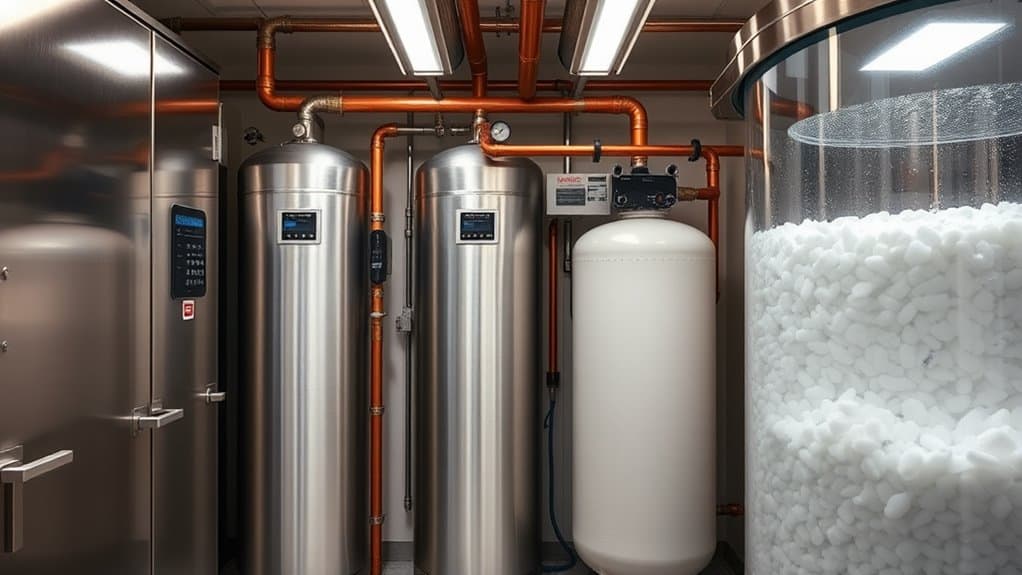
While luxury hotels spare no expense in creating memorable guest experiences, their investment in premium water softening systems often goes unnoticed despite being fundamental to their operations. These systems are designed to protect appliances from hard water damage, which is critical for maintaining high-quality service. We’ve discovered these systems are critical infrastructure that process hundreds of thousands of gallons daily. Why do they invest so heavily? These systems effectively eliminate mineral buildup in plumbing, extending equipment lifespan while reducing maintenance costs. They’re also essential for the quality touches guests actually notice—softer towels, cleaner glassware, and better-tasting beverages. The impact on skin and hair comfort creates that subtle luxury feel that keeps guests returning, making water softeners a non-negotiable investment. Top hotels implement non-electric twin tank systems that provide continuous soft water without interruption even during regeneration cycles.
The Hidden Benefits of Soft Water for Hotel Operations
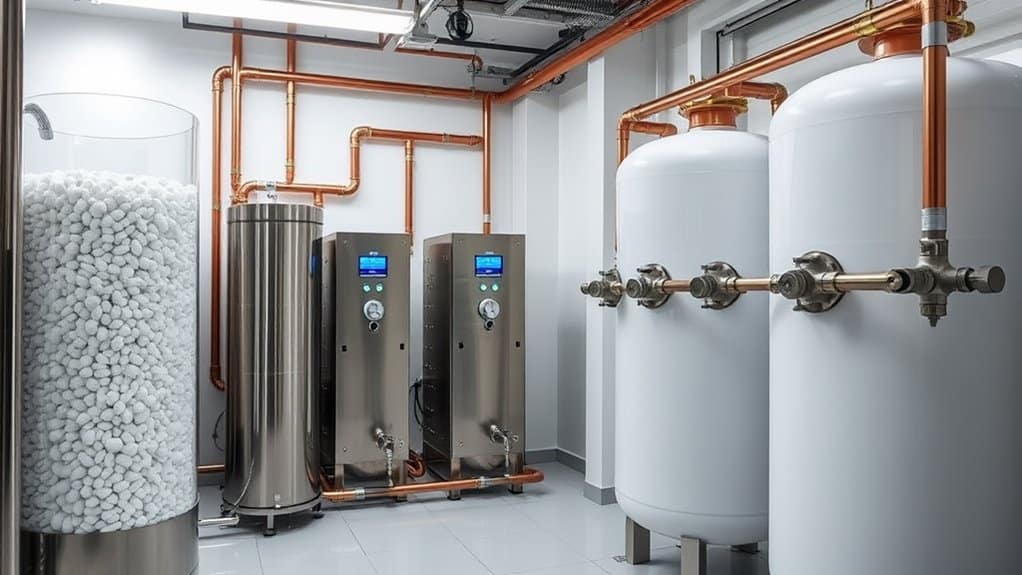
Beyond the guest-facing amenities, soft water systems deliver substantial operational advantages that directly impact a hotel’s bottom line. We’ve found that hotels using soft water save up to 40% on detergent costs while extending the lifespan of washing machines by preventing mineral buildup. Additionally, transforming utility bills with a smart water softener can lead to significant savings on overall operational costs.
Cleaning staff use fewer chemicals as soft water naturally prevents streaks and deposits on surfaces. Plumbing fixtures last significantly longer, reducing maintenance expenses.
Soft water also enhances the overall visual appeal of dishware and silverware, eliminating cloudy residue and white buildup that negatively impact dining presentation.
The operational efficiency gains are noteworthy—less time spent cleaning, fewer plumbing repairs, and reduced appliance replacements. These behind-the-scenes benefits create a compounding effect that maximizes profitability while simultaneously enhancing guest experiences.
Inside the Hotel Industry’s Preferred Water Softener Brands
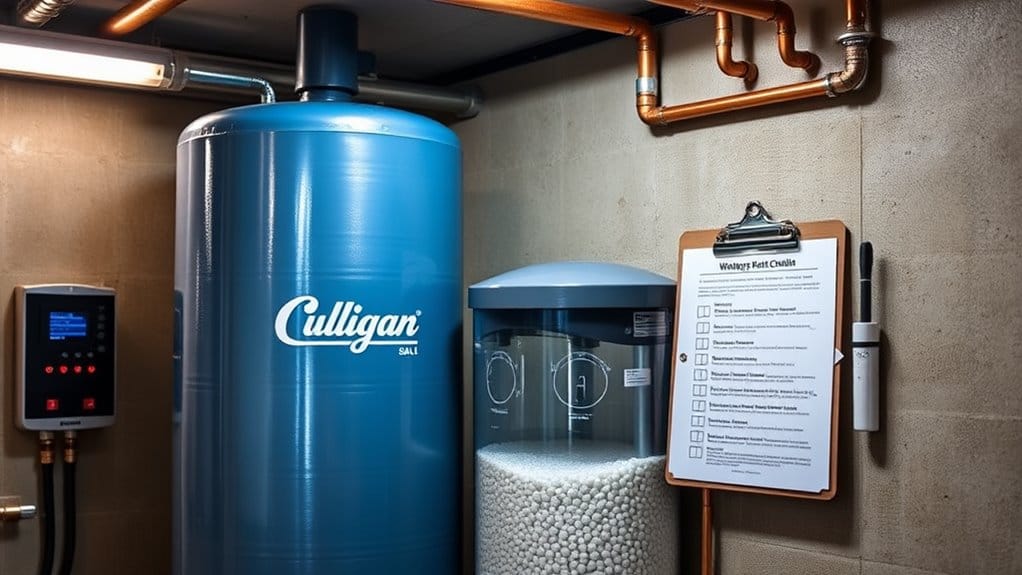
When selecting water softening systems for hospitality properties, hotel engineers and management prioritize reliability, efficiency, and long-term performance. Industry leaders like Culligan and Pentair dominate the market due to their specialized commercial solutions. These systems are designed to provide remarkably effective solutions that ensure guest satisfaction without compromising water quality.
| Brand | Key Advantage | Typical Application |
|---|---|---|
| Culligan | Nationwide service network | Full-service hotels |
| Pentair | Advanced filtration options | Luxury properties |
| Robert B. Hill | Custom engineering | Resorts with unique water conditions |
Most hotel systems utilize ion exchange technology with dual-tank configurations to ensure uninterrupted operation. A typical 120-key property requires two 24″ diameter softener tanks and one 30″ brine tank, occupying approximately 7′ × 2.5′ of mechanical room space. These high-quality systems help create consistent water experiences for guests across all hotel rooms and locations.
How Water Softeners Transform the Guest Experience
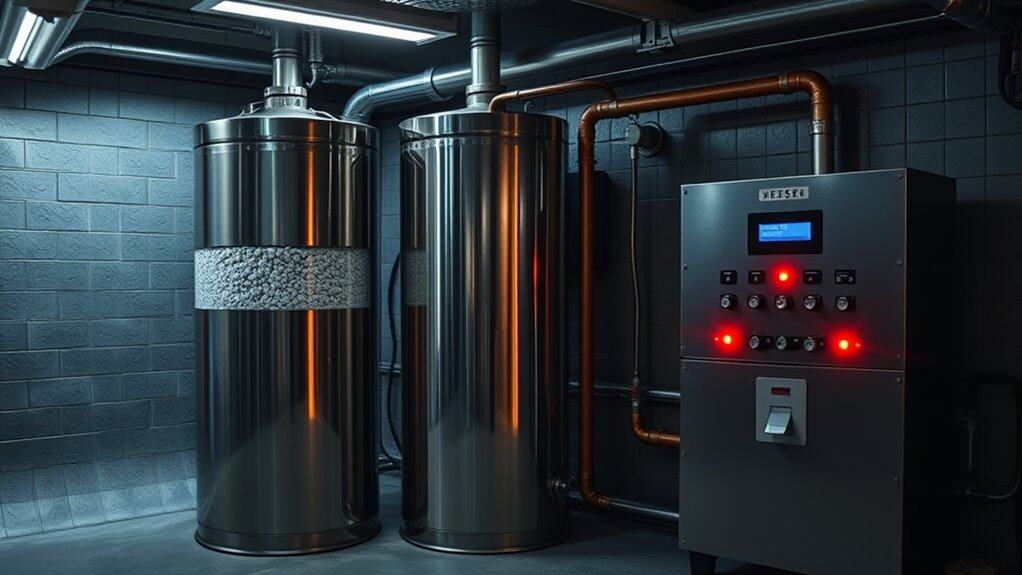
The implementation of proper water softening systems extends far beyond the mechanical room benefits.
We’ve found that guests immediately notice the difference in their rooms, even if they can’t identify the exact cause. In fact, dramatic water quality improvements can significantly enhance their overall stay.
Soft water transforms bathroom fixtures, keeping them gleaming without scale buildup or streaking.
Linens feel noticeably softer against skin while maintaining brightness through more wash cycles.
Glassware emerges spotless from dishwashers.
Hotels in regions like Round Rock and Dripping Springs particularly benefit from addressing their hard water issues.
Operationally, hotels achieve significant savings through extended equipment lifespans, reduced detergent usage (up to 40%), and lower energy consumption from scale-free heating systems. These efficiencies convert directly to improved guest experiences and stronger bottom lines.
Frequently Asked Questions
How Often Do Hotels Need to Regenerate Their Water Softening Systems?
We regenerate hotel water softening systems every 1-3 days depending on water hardness, guest occupancy, and system capacity. Higher hardness levels and usage patterns require more frequent regeneration cycles.
Do Hotels Treat Drinking Water Differently Than Shower/Bath Water?
We typically treat drinking water more extensively than shower water in hotels. While all water receives basic filtration, drinking sources get additional reverse osmosis or POU purification for superior safety and taste.
What’s the Environmental Impact of Hotel-Scale Water Softening Salt Discharge?
We’re seeing significant environmental impacts from hotel water softener discharge, including aquatic ecosystem damage, wastewater treatment complications, and soil degradation from chloride buildup—affecting approximately 100,000-250,000 gallons of water per hotel monthly.
Can Guests Request Rooms With Unsoftened Water?
We don’t typically offer unsoftened water rooms because hotels use centralized softening systems. Infrastructure limitations prevent room-level customization, making it impractical to accommodate such specific guest requests under standard operations.
How Much Do Hotels Spend Annually on Water Softener Maintenance?
We estimate hotels spend $2,000-$5,000 annually on water softener maintenance, including salt ($600-$1,200), inspections ($400-$800), resin replacement ($500-$1,500), and energy costs ($500-$1,500) for typical systems.
Conclusion
We’ve uncovered that most luxury hotels rely on commercial-grade ion exchange softeners from Culligan, Kinetico, or Ecowater systems—typically installed as twin-tank configurations with 3″ valve bodies and 2.5-5.0 cubic feet of resin per tank. They’re regenerating at precise 2,300-2,800 grain capacity thresholds using precision brining systems. This investment pays dividends through reduced scale in boilers, extended linen life, and consistently superior guest experiences.

Craig “The Water Guy” Phillips is the founder of Quality Water Treatment (QWT) and creator of SoftPro Water Systems.
With over 30 years of experience, Craig has transformed the water treatment industry through his commitment to honest solutions, innovative technology, and customer education.
Known for rejecting high-pressure sales tactics in favor of a consultative approach, Craig leads a family-owned business that serves thousands of households nationwide.
Craig continues to drive innovation in water treatment while maintaining his mission of “transforming water for the betterment of humanity” through transparent pricing, comprehensive customer support, and genuine expertise.
When not developing new water treatment solutions, Craig creates educational content to help homeowners make informed decisions about their water quality.


